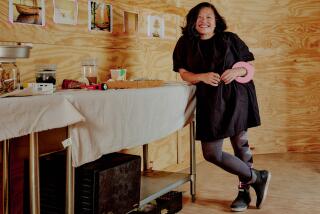Trips Home Fill Fridge With Food of Love--and Food for Thought
- Share via
My mom conducts her food interrogation over the phone. “Did you drink your milk in the morning?” she asks in Korean.
“Did you take your vitamins? What do you have in your refrigerator? Do you have any rice left? Did you eat the bulgogi [thinly sliced beef] I sent with you last time? How about kimchi? What did you have for dinner?”
She’s not satisfied with some of my answers.
“What, only spaghetti for dinner?” she asks in dismay.
“It’s always spaghetti, spaghetti. Why don’t you eat some more meat and fish? Why do you eat so much Italian food? It’s too shyu [sour]. Why didn’t you drink your milk? That’s why you’re so small,” she remarks.
My parents call me at my home in Ventura two or three times a week. Without fail, they lecture me about eating well. They seem convinced I’m on the verge of starvation, their views unchanged by the details I give them of three healthy meals I’ve eaten on a given day.
So when I visit them at their home in Los Angeles on weekends, they often act as if they’re conducting an emergency food operation. My mom will rush off to the kitchen and bring back whatever she can muster up: cut persimmons, bibimbap [mixed rice and vegetables], her health concoction of juiced carrots, celery and, yuck . . . raw potatoes.
Food is a serious matter to my parents.
They scold me if I leave food on my plate and frown if I don’t eat my food with relish. During the holidays when everything seems to center around food, the phrase they repeat even more than usual is, “Eat more. Eat more.”
In a country where Jenny Craig reigns in every suburb, a nation where some people risk intestinal distress to chomp on some fat-free potato chips with Olestra, and a place that plasters waif Kate Moss on every magazine cover, it’s nice to hear my parents say that real food is something to appreciate rather than to dread or avoid.
They speak from the experiences of growing up as children during war-torn times in Korea. And they wish I, their oldest daughter, who skips a meal once in a blue moon, could somehow understand what it means to be truly hungry without experiencing true hunger.
They want me to value what it means just to have food to eat. It’s been more than 24 years since my parents immigrated to the United States and even longer since they went through the Korean War. They have forgotten much, but what they remember clearly is the absence of food. My dad threw grenades left behind by American GIs into ponds to collect the dead floating fish. My mother went to bed many nights with stomach pains--not enough food to share among her and her two brothers. My dad and his townspeople were so desperate they ate bark they stripped off trees.
The country that my parents left more than two decades ago has prospered enough so that many of the younger-generation Koreans there frequently say, “Have fun eating,” but to my parents, saying, “Eat more,” is still their way of showing they care, of displaying their love, of sharing what they have.
Before I head toward my own home at the end of a weekend, they put in grocery bags full of food on the passenger side of my car: the American food, such as chili, cereal and cookies, and the Korean stuff--frozen mandu [dumplings], kimchi, dooboo [tofu] and spiced melchi [anchovies].
My mother also hands me some boricha [wheat tea] and sliced apples to sustain me for the ride on the Ventura Freeway back over the Conejo Grade, past the Camarillo outlet mall, beyond the Oxnard farm fields, back to my Ventura studio, where I store the food in the refrigerator and think, sometimes, that I’m a lucky person but not grateful enough.
More to Read
Eat your way across L.A.
Get our weekly Tasting Notes newsletter for reviews, news and more.
You may occasionally receive promotional content from the Los Angeles Times.










